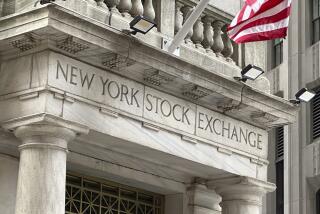Citigroup and Wells Fargo shares fall on lower quarterly revenue
- Share via
Wall Street’s message to Citigroup Inc. and Wells Fargo & Co.: Cost cutting and accounting gains don’t substitute for growing your business.
Investors sent shares of both banks sharply lower Monday after they reported third-quarter revenue — aside from special adjustments — dropped amid economic turbulence in the U.S. and Europe. Shares of Citi, the nation’s third-largest lender, fell nearly 2%; Wells Fargo shares shed 8%.
The results were announced on a bad day overall for financial stocks, which were hurt by comments from the German finance minister that there would be no speedy solution to the debt crisis in Europe. An index of 24 bank stocks slid 3.9% on fears that problems overseas could spread to U.S. banks.
Wells Fargo said Monday its third-quarter profit jumped 21% as it sorted out bad-loan troubles and reduced expenses. But a 6% drop in revenue amid the sluggish economy spooked investors.
The San Francisco bank earned $4.06 billion, or 72 cents per share, compared with $3.34 billion, or 60 cents, a year earlier. Revenue fell from $20.87 billion to $19.63 billion as income from interest, fees and trading declined. Wells Fargo shares plunged $2.25 to $24.42.
Meanwhile, Citigroup posted a 74% jump in third-quarter earnings, though much of the gain came from an accounting adjustment. The New York bank said growth in the developed world could remain slow for years.
Citi earned $3.77 billion, or $1.23 per share, up from $2.17 billion, or 72 cents, a year earlier. But the results included a pre-tax gain of $1.9 billion because the bank theoretically could buy back its debt at a profit in today’s volatile markets. Including the accounting gain, Citigroup revenue rose 1% from the same period last year to $20.8 billion. Excluding the gain, it fell 8% to $18.9 billion. Its shares fell 47 cents to $27.93.
Executives at both banks discussed the environment of new or higher fees charged to customers after Bank of America Corp. disclosed plans to slap a $5 fee on many customers for using debit cards. The announcement drew loud protests from customers and politicians.
During the Wells Fargo earnings call, analyst Chris Kotowski of Oppenheimer & Co. suggested the $5 fee might become an industry standard. By his calculation, the fee would largely offset revenue big banks have lost from the Federal Reserve cutting in half the amount they can charge merchants who accept debit cards for payments.
Wells Chief Executive John Stumpf was guarded in his comments on how his bank would proceed on that front, referring to a pilot program started recently in a few states that charges a $3 monthly fee for customers who make purchases with debit cards.
But Stumpf emphasized that Wells Fargo, while proceeding cautiously, needs to be compensated for the cost of providing multiple ways for customers to access their deposits. “Our customers are going to tell us ... how they’ll pay for those services,” Stumpf said.
Wells executives said they had taken note of Occupy Wall Street and related protests and expressed some sympathy for the protesters, given a weak economic recovery that has done little to reduce unemployment.
“There’s a lot of frustration out there, a lot of pain,” Chief Financial Officer Timothy Sloan said in an interview. Sloan’s home in the Pasadena area was the site of a protest by Occupy Los Angeles demonstrators this month.
He said Wells Fargo is doing what it can to address the problems voiced by protesters. The bank has increased lending, especially to small businesses, he said, and has modified 700,000 of the home loans it services, including $4 billion in principal reductions.
Analysts found few surprises in the mortgage business at Wells Fargo, the biggest U.S. home lender, as it continued to work through soured loans from the housing boom and saw its pipeline of new loans swell with refinancings.
Provisions for loan losses dropped to $1.81 billion in the quarter from $3.44 billion a year earlier, while the bank charged off as uncollectable 1.37% of its loans, down from 2.14% in the year-earlier period.
However, its net interest margin, which measures the difference between the cost of deposits and earnings on loans, declined to 3.84% from 4.25% in the third quarter of 2010.
More to Read
Inside the business of entertainment
The Wide Shot brings you news, analysis and insights on everything from streaming wars to production — and what it all means for the future.
You may occasionally receive promotional content from the Los Angeles Times.











